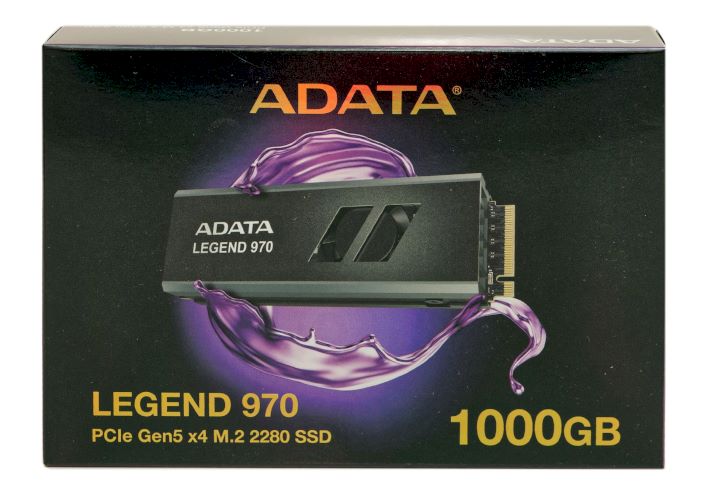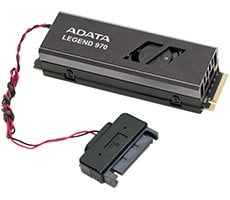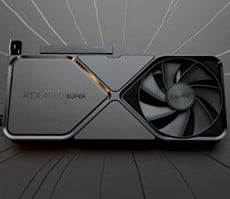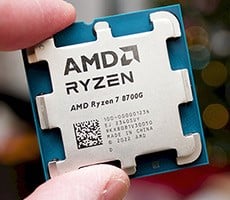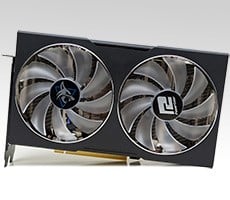ADATA Legend 970 Review: A Speedy, Actively-Cooled Gen 5 SSD
HDTune v5.75 Benchmarks
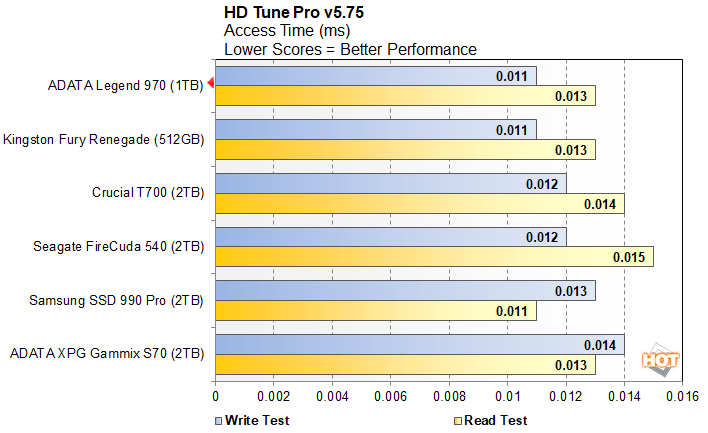
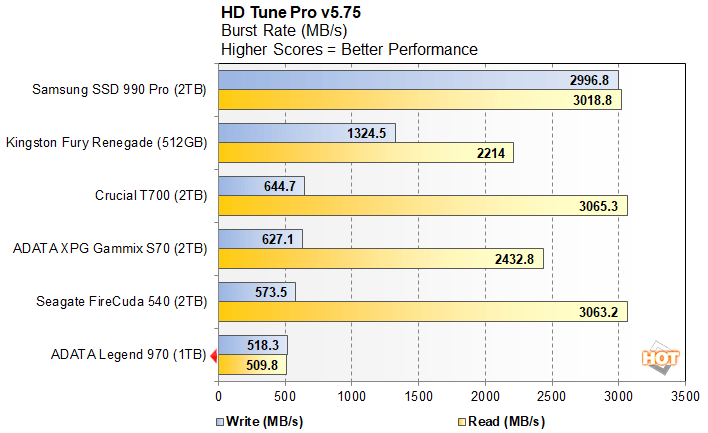
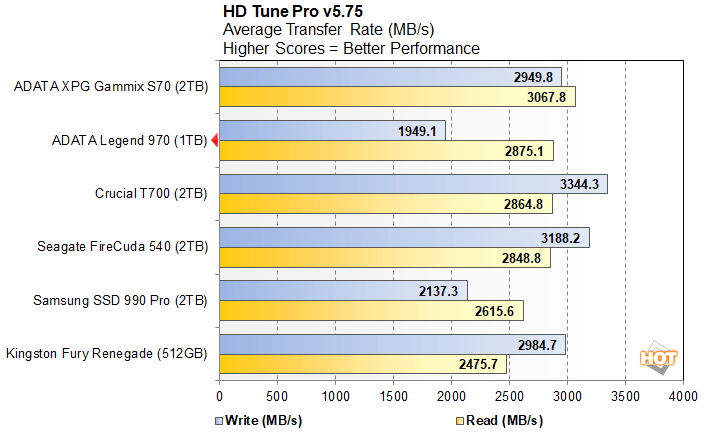
HD Tune Pro, as the name suggests, is an older benchmark that was originally created for hard drives. It has been updated to work with SSDs these days, but the tests are still oriented toward the kind of accesses you'd normally do using some old spinning rust. Whatever it's doing, Samsung's SSD controller is all about it, blowing away the rest of the pack in the burst rate test. However, the PCIe 5.0 drives do a lot better in the average transfer rate tests, naturally.
CrystalDiskMark x64 Benchmarks
CrystalDiskMark is a synthetic benchmark that tests both sequential and random small and mid-sized file transfers using incompressible data. It provides a quick look at best and worst case scenarios with regard to SSD performance, best case being larger sequential transfers and worse case being small, random transfers.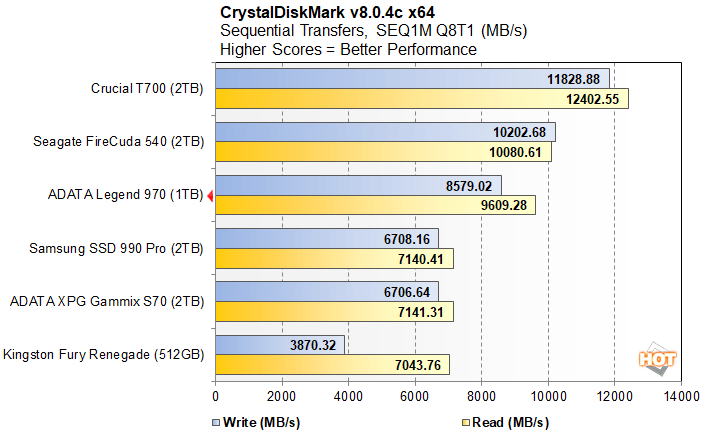
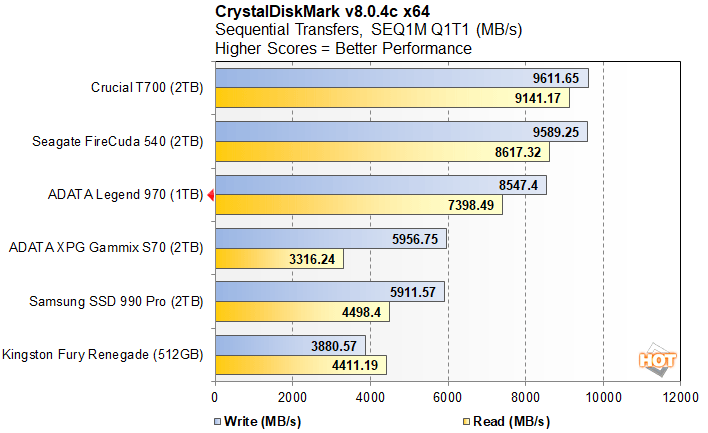
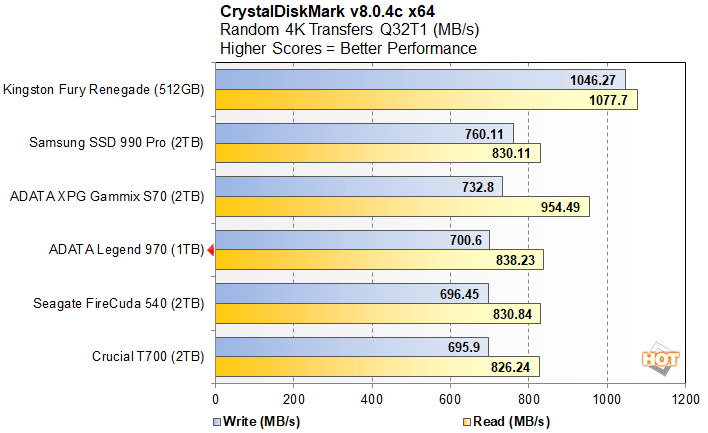
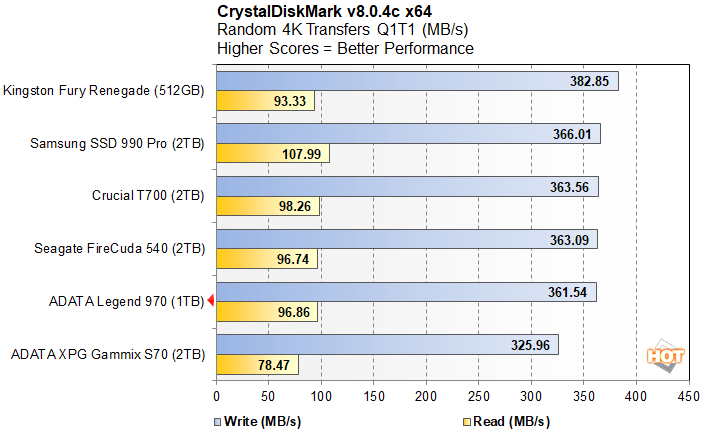
In CrystalDiskMark's random transfer tests, we'd think we were bound by some other factor (CPU? driver latency?) rather than the drives themselves, as the results are all so similar. We say "we would," because the Kingston Fury Renegade is out there kicking butt in the Q32T1 test. However, all of the Q1T1 results are nearly identical. The Legend 970 fails to distinguish itself in this category, but then, so does everything else.
Final Fantasy XIV: Endwalker Game Level Load Times
We also tested game level load times using the Final Fantasy XIV: Endwalker benchmark. This tool loads an array of different game levels during its graphics benchmark and outputs the average result when complete.
Despite some of the less-inspiring results in the previous tests, the Legend 970 is our second-fastest drive in the real-world game load test, coming in scant microseconds behind the Crucial T700, which is the fastest consumer SSD we've tested to date.
UL's 3DMark Gaming Storage Benchmark
UL recently added a gaming-centric storage benchmark to 3DMark, that leverages trace-based tests of actual PC games and gaming-related activities (like streaming with OBS) to measure real-world gaming performance in a variety of scenarios. The tests include things like loading Battlefield V, Call of Duty: Black Ops 4, and Overwatch from the initial launch to the main menu, recording a 1080p gameplay video at 60 FPS with OBS while playing Overwatch, installing The Outer Worlds and saving game progress. And finally, copying the Steam folder for Counter-Strike: Global Offensive from one drive to another.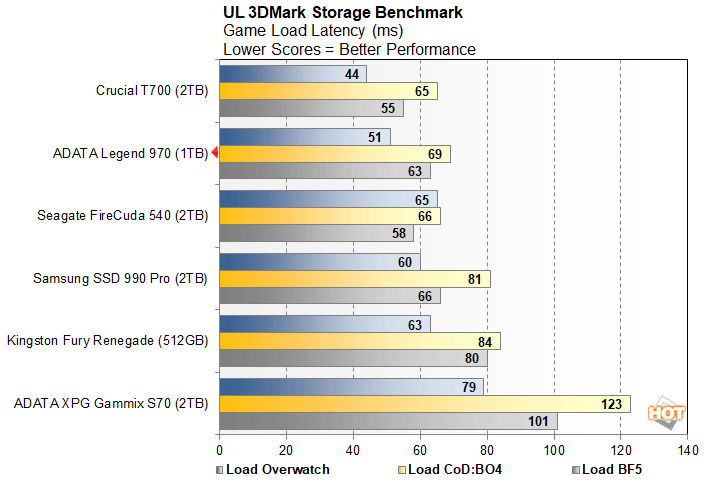
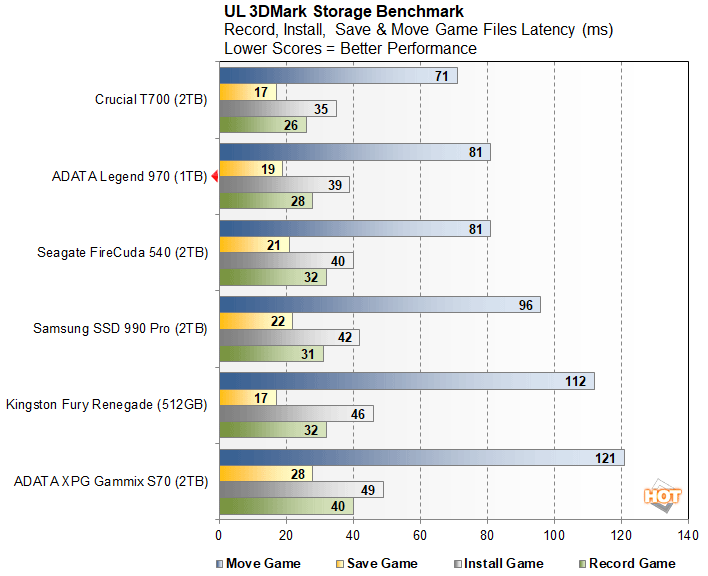
Once again, in these real-world game loading tests, the Legend 970 does very well, coming in just behind the market-leading Crucial T700. The ADATA drive's performance is fantastic here, no doubt bolstered by its integrated cooling solution.
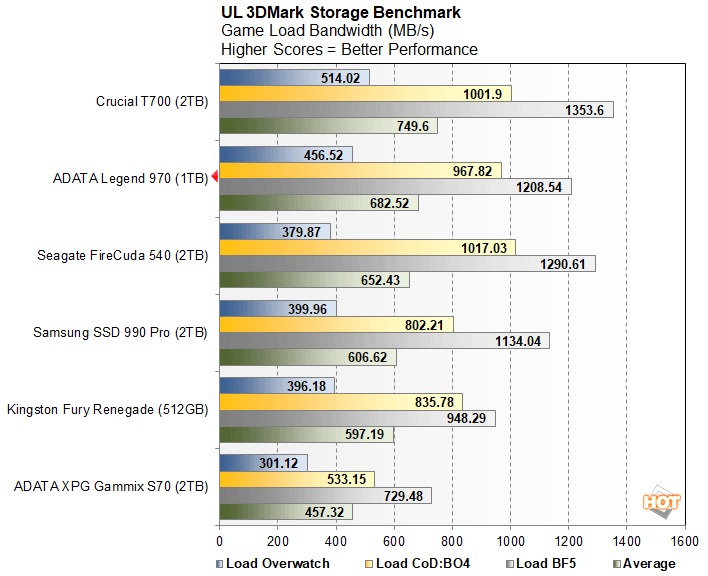
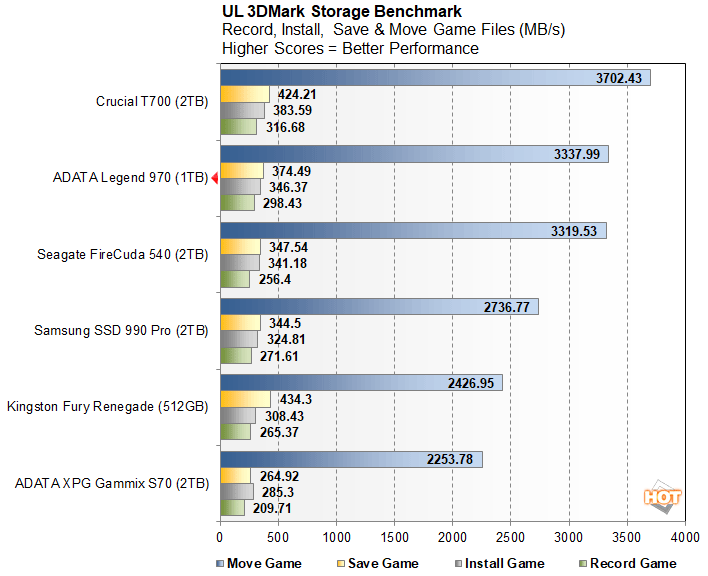
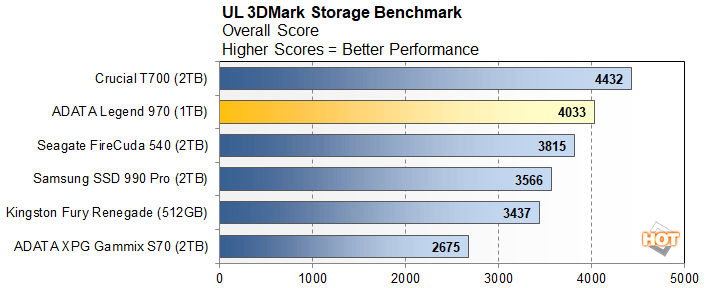
As these benchmarks include a considerable amount of sequential drive accesses in the "install game" and "record game" tests, the PCIe 5.0 drives do very well here, and the older 4.0 drives can't really keep up. ADATA's drive trades blows with the Seagate FireCuda 540, which is a good place to be, as that's also a very fast SSD.
UL's PCMark 10 System Drive Storage Test
We like PCMark 10's new quick storage benchmark module for its real-world application measurement approach to testing. PCMark offers a trace-based measurement of system response times and bandwidth under various scripted workloads of traditional client / desktop system use cases.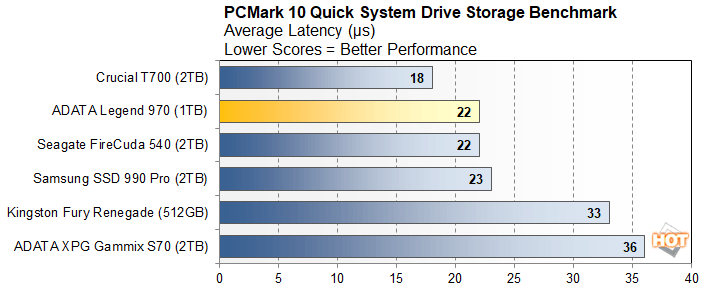
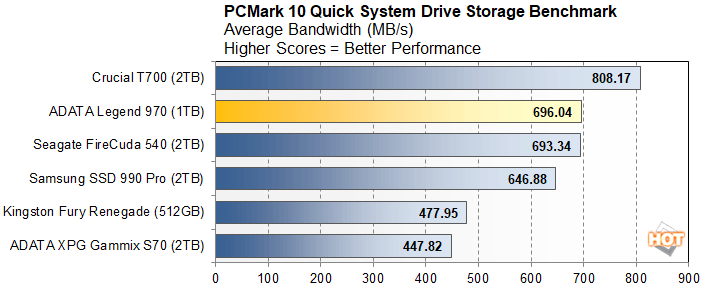
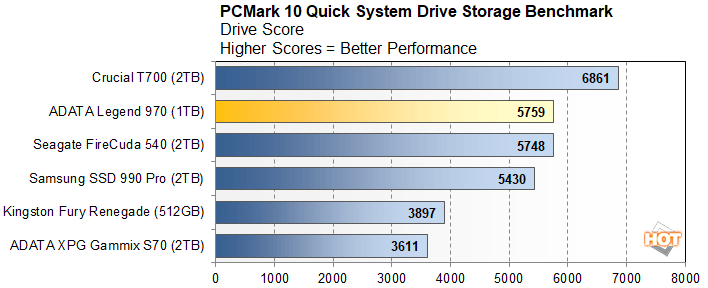
Finally, these system drive benchmarks test how the SSDs would perform if used as the boot drive for a machine. While the benchmark, like most semi-synthetic tests, exaggerates differences between drives, it nevertheless is reasonably representative for this kind of workload.
In PCMark, we once again see the Legend 970 running neck and neck with the FireCuda 540. Their results are "margin of error" close here. Both drives use the same controller and flash configuration, so it's really just down to whatever secret sauce each company has embedded into the drives' firmware and environmental factors at the time.
ADATA Legend 970 Gen 5 SSD: The Verdict
Benchmark charts don't always tell the full story. You could compare the best and second-best products in the world, and some people will come away with a worse impression than they should. That's a mental pitfall to avoid; it's important to keep these things in context.
As we said in our review of the FireCuda 540, these are some of the fastest SSDs in the world right now. It's true that the Legend 970 doesn't usually distinguish itself among its PCIe 5.0 peers. That may sound detrimental, but it's also good—it doesn't stand out in a negative way, either. The ADATA Legend 970 performs exactly as you'd expect a Phison E26-based PCIe 5.0 SSD to perform: about 10 GB/second on sequential accesses, and high throughput thanks to its speedy NAND and integrated cooling solution.
When reviewing a drive like this, you've got to figure out what sets it apart from its competitors. The Legend 970's standout feature is the included cooler. This is a great feature for a lot of builders, as PCIe 5.0 SSDs using Phison E26 controllers can draw in excess of ten watts under load, and having active cooling can really help to ensure that the SSD continues operating at full speed under heavy use.
However, a lot of motherboards these days include their own cooling apparatus for M.2 SSDs. There's also situations like in the PlayStation 5, where a beefy cooler like this won't fit—and even if it did, there's no way to power it. Those situations might reduce the value of the boxed cooling solution on the Legend 970.
Ultimately, unlike most of ADATA's other drives, the Legend 970's price may be hurdle. Competing PCIe 5.0 SSDs are already dropping in price, with the Corsair MP700 and the Crucial T700 both a bit cheaper than the Legend 970 as of today. ADATA has a compelling product here, but unless you absolutley need the active cooler, there are more affordable options available that offer similar performance.


